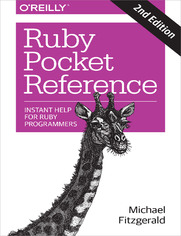Ruby Pocket Reference. 2nd Edition - Helion

ISBN: 978-14-919-2597-3
stron: 224, Format: ebook
Data wydania: 2015-08-10
Ksi─Ögarnia: Helion
Cena ksi─ů┼╝ki: 46,74 z┼é (poprzednio: 54,99 z┼é)
Oszczędzasz: 15% (-8,25 zł)
Updated for Ruby 2.2, this handy reference offers brief yet clear explanations of Ruby’s core elements—from operators to blocks to documentation creation—and highlights the key features you may work with every day. Need to know the correct syntax for a conditional? Forgot the name of that String method? This book is organized to help you find the facts fast.
Ruby Pocket Reference, 2nd Edition is ideal for experienced programmers who are new to Ruby. Whether you’ve come to Ruby because of Rails, or you want to take advantage of this clean, powerful, and expressive language for other applications, this reference will help you easily pinpoint the information you need.
You’ll find detailed reference material for:
- Keywords, operators, comments, numbers, and symbols
- Variables, pre-defined global variables, and regular expressions
- Conditional statements, method use, classes, and exception handling
- Methods for the BasicObject, Object, Kernel, String, Array, and Hash classes
- Time formatting directives
- New syntax since Ruby 1.9
Osoby które kupowały "Ruby Pocket Reference. 2nd Edition", wybierały także:
- Ruby on Rails. ─ćwiczenia 18,75 z┼é, (3,00 z┼é -84%)
- Ruby Cookbook. 2nd Edition 166,11 zł, (29,90 zł -82%)
- RESTful Rails Development. Building Open Applications and Services 135,91 zł, (29,90 zł -78%)
- Learning Rails 3. Rails from the Outside In 115,00 zł, (29,90 zł -74%)
- Continuous Delivery for Mobile with fastlane 137,59 zł, (39,90 zł -71%)
Spis tre┼Ťci
Ruby Pocket Reference. 2nd Edition eBook -- spis tre┼Ťci
- 1. Ruby Pocket Reference
- Introduction
- Conventions Used in This Book
- Using Code Examples
- Safari Books Online
- How to Contact Us
- Acknowledgments
- Running Ruby
- Running the Ruby Interpreter
- Interactive Ruby (irb)
- Using a Shebang Comment on Unix/Linux
- Associating File Types on Windows
- Rubys Keywords
- Rubys Operators
- Comments
- Numbers
- Variables
- Local Variables
- Instance Variables
- Class Variables
- Global Variables
- Constants
- Parallel Variable Assignment
- Symbols
- Predefined Global Variables
- Keyword Literals
- Global Constants
- Ranges
- Methods
- Block Arguments
- Return Values
- Method Name Conventions
- Default Arguments
- Variable Arguments
- Aliasing Methods
- Blocks
- The yield statement
- Procs
- Conditional Statements
- Flow Control
- The if Statement
- Negation
- Multiple tests
- Statement modifier for if
- The else statement
- The elsif statement
- The unless Statement
- Statement modifier for unless
- The while Statement
- Statement modifier for while
- The until Statement
- Statement modifier for until
- The case Statement
- The for Loop
- The Conditional Operator
- Executing Code Before or After a Program
- Classes
- Reopening a Ruby Class
- Instance Variables
- Accessors
- Class Variables
- Class Methods
- Singletons
- Inheritance
- Load path
- Abstract Classes
- Anonymous Classes
- Public, Private, and Protected
- Modules and Mixins
- Files
- Creating a New File
- Opening an Existing File
- ARGV and ARGF
- Renaming and Deleting Files
- File Inquiries
- File Modes and Ownership
- The IO Class
- Exception Handling
- The rescue and ensure Clauses
- The raise Method
- The catch and throw Methods
- BasicObject Class
- BasicObject Public Instance Methods
- Object Class
- Object Public Instance Methods
- Kernel Module
- String Class
- String Literals
- String Concatenation
- Expression Substitution
- General Delimited Strings
- Here Documents
- Escape Characters
- Character Encoding
- Regular Expressions
- Regular Expression Reference Tables
- Character classes
- Anchors
- Character shorthands
- POSIX bracket expressions
- Quantifiers
- Character properties
- Unicode character categories
- Unicode scripts
- Modifiers (options)
- Special global variables
- Encoding overrides
- Extended groups
- Back references
- Subexpression calls
- Regular Expression Reference Tables
- String Methods
- Public class methods
- Public instance methods
- Array Class
- Creating Arrays
- Array Class Methods
- Array Instance Methods
- Hash Class
- Creating Hashes
- Hash Class Methods
- Hash Instance Methods
- Time Formatting Directives
- Ruby Documentation
- RubyGems
- Rake
- Ruby Resources
- Glossary
- Index





